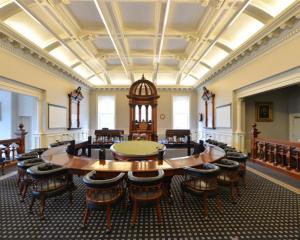
It is also seeking the support in principle of the council for the installation of 1000 extra permanent seats at the University Oval cricket ground.
Otago Cricket Association chief executive Ross Dykes asked that the council remove the trees alongside Logan Park Dr as they cast shadows across the ground that force umpires to cut short some games because of the safety issues posed by the mixture of good and bad light on the pitch.
Otago Cricket's submission to the council on the draft annual and long-term budgets, to which Mr Dykes spoke, said the trees were causing disruption to first-class cricket, had the potential to negatively impact on scheduling of international fixtures at University Oval and were a hazard to both the public and vehicles due to falling branches.
Because umpires had to apply safety standards evenly, there was even one "quite bizarre" occurrence this year, when Otago was denied certain victory despite the Otago batsmen being the ones at risk, the submission said.
Otago Cricket had understood the trees were to be cut down last year, and that they were past their best and presented safety issues.
Cr John Bezett pointed out the removal of the trees was one of the projects put back several years in the draft long-term plan, and councillors could consider whether to bring the work forward. Mr Dykes said Otago Cricket would like to see the trees go sooner rather than later.
In a second submission, Otago Cricket sought the support in principle of the council to build a new stand with 1000 seats at the University Oval.
Otago Cricket would pay for the seats, and was exploring sourcing a block of unused seats from Carisbrook, but as it was not in the business of owning infrastructure, would expect the council would take over ownership of the stand at some point, Mr Dykes told councillors.
NZ Cricket required the Oval to have 5000 seats if it wanted to hold a five-day England test match in Dunedin in March next year, and Otago Cricket had committed to do that.
It had initially sought $90,000 from the council to cover the cost of installing 2000 temporary seats at the ground to bring capacity up to 5000; however Mr Dykes said Otago Cricket accepted that amount was unlikely to be forthcoming and would raise the funds itself so the test match, and future ones, could be secured.
It would, however, like to have the council's support in principle before it went ahead.
Otago Cricket was strongly in favour of putting in the extra permanent seats, he said.
"If we are to have an international venue, it seems silly to keep asking for temporary seating."
A council report on the submission said the council had invested $2.7 million in the University Oval since 2006 to bring it up to a full international standard facility, and noted annual maintenance costs had also increased correspondingly.












